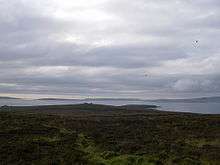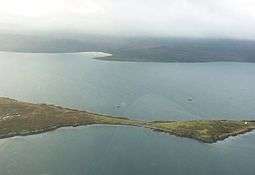Cava, Orkney

| Norse name | Kálfey |
|---|---|
| Meaning of name | Old Norse meaning 'calf island' |
 North Cava and Cava Light, Hoy in background, from a glider flying over Scapa Flow. | |
| Location | |
 Cava Cava shown within Scotland | |
| OS grid reference | ND326998 |
| Physical geography | |
| Island group | Orkney |
| Area | 107 ha (0.41 sq mi) |
| Area rank | 147 [1] |
| Highest elevation | 38 m (125 ft) |
| Administration | |
| Sovereign state | United Kingdom |
| Country | Scotland |
| Council area | Orkney Islands |
| Demographics | |
| Population | 0 |
| References | [2][3][4][5] |
.jpg) Calf of Cava lighthouse, at the northern tip of the island | |
 Orkney | |
| Location |
Cava Orkney Scotland United Kingdom |
|---|---|
| Coordinates | 58°53′14″N 3°10′40″W / 58.887160°N 3.177844°W |
| Year first constructed | 1898 |
| Construction | cast iron tower |
| Tower shape | cylindrical tower with balcony and lantern |
| Markings / pattern | white tower and lantern |
| Height | 9.5 metres (31 ft) |
| Focal height | 11 metres (36 ft) |
| Light source | solar power |
| Characteristic | Fl WR 3s. |
| Admiralty number | A3636 |
| NGA number | 3176 |
| ARLHS number | SCO-044 |
| Managing agent | Northern Lighthouse Board[6] |
Cava is an uninhabited island in the Orkney archipelago in Scotland. It is 107 hectares (0.41 sq mi) in extent and rises to 38 metres (125 ft) above sea level. The literal meaning of the name is calf island, a terminology often used to designate a small island near to a larger one. Cava is unusual in that it includes a small peninsula joined to the main body of the island by a narrow isthmus, which is in turn called Calf of Cava.
It is situated in the Scapa Flow just offshore from the much larger island of Hoy. Nearby are the islets of Rysa Little and Fara and the skerry Barrel of Butter. To the south of Cava, between Fara and Rysa Little lies Gutter Sound, the scene of the mass-scuttling of the interned German Imperial High Seas Fleet in 1919.
In the eighteenth century a notorious Orkney pirate, John Gow, raided Hall of Clestrain, in Orphir and abducted two servant girls. Reports vary as to their treatment, with one claiming that they were put ashore on Cava "so loaded with presents that they soon afterwards got husbands."[7] Gow's ship Revenge then ran ashore on the Calf of Eday, leading to his capture.[8]
However, in common with a number of the smaller South Isles of Orkney, Cava lost its resident population during the course of the twentieth century.[9] There is no longer a habitable building on the island. There are no good anchorages in the vicinity.[2]
See also
- List of lighthouses in Scotland
- List of Northern Lighthouse Board lighthouses
- Calf of Eday
- Calf of Man
- Calf of Flotta
- List of Orkney islands
References
- ↑ Area and population ranks: there are c. 300 islands over 20 ha in extent and 93 permanently inhabited islands were listed in the 2011 census.
- 1 2 Haswell-Smith, Hamish (2004). The Scottish Islands. Edinburgh: Canongate. ISBN 978-1-84195-454-7.
- ↑ Ordnance Survey
- ↑ Anderson, Joseph (Ed.) (1893) Orkneyinga Saga. Translated by Jón A. Hjaltalin & Gilbert Goudie. Edinburgh. James Thin and Mercat Press (1990 reprint). ISBN 0-901824-25-9
- ↑ Pedersen, Roy (January 1992) Orkneyjar ok Katanes (map, Inverness, Nevis Print)
- ↑ Cava The Lighthouse Directory. University of North Carolina at Chapel Hill. Retrieved 27 May 2016
- ↑ "John Gow - The Orkney Pirate" Orkneyjar. Retrieved 11 Mar 2012.
- ↑ Haswell-Smith (2004) p. 388
- ↑ Wenham, Sheena (2003). The Orkney Book by Omand, Donald (ed.), ed. The South Isles. Edinburgh: Birlinn. p. 208.
External links
Coordinates: 58°52′42.7″N 3°10′03.9″W / 58.878528°N 3.167750°W